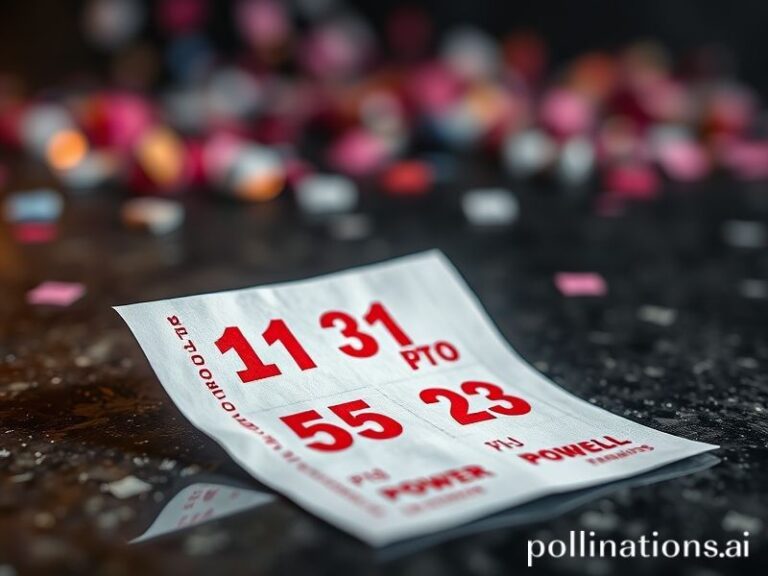Michael McIntyre: The Comic Export Calming a World on Fire—One Self-Checkout Joke at a Time
Michael McIntyre: How a Man in Skinny Jeans Became the UN’s Unofficial Jester of the Apocalypse
Byline: Dave’s Locker foreign desk, filed from an over-air-conditioned lounge in Singapore where the gin is warm but the Wi-Fi is existential.
Walk into any expat bar from Lagos to Lima and you’ll hear the same low-grade grumbling about late-stage capitalism, the climate, and why the hotel can’t manage a decent poached egg. Yet drop the name Michael McIntyre—yes, the British comic who dresses like an overexcited intern at a hedge fund—and watch the room light up like a sanctions announcement on a Russian oligarch’s phone. McIntyre, 48, has quietly become the planet’s most efficient export of comic relief since nitrous oxide, and the joke is on all of us.
The figures are almost obscene. Netflix claims his 2018 special “Showman” has been streamed in 190 countries, or roughly every territory that still has electricity and a lingering sense of guilt about colonialism. In India, Amazon Prime subtitles his gags into seven regional languages, ensuring that jokes about supermarket self-checkouts land even where there are, mercifully, no supermarkets. Meanwhile, on the African continent, pirated DVDs of his arena tours circulate faster than vaccine hesitancy. One Lagos street vendor told me—between sips of a suspiciously flammable energy drink—that McIntyre is “relatable because he also shouts at his children; only difference is his kids have passports.”
The secret sauce? Universality wrapped in upper-middle-class panic. McIntyre mines the banal—Uber ratings, automated toilets, the existential dread of forgetting one’s Waitrose loyalty card—and renders it in a high-octane physicality that translates better than most UN resolutions. A Serbian diplomat once confessed that after a 14-hour emergency session on grain corridors, the delegation unwound with McIntyre’s bit about sneaking chocolates into a cinema. “We may starve,” she shrugged, “but at least we can laugh about overpriced popcorn.”
Of course, the global south’s embrace carries its own irony. In countries where inflation is measured in hourly increments, audiences roar at McIntyre’s outrage over paying £4 for a flat white. Scholars at the University of Cape Town call it “aspirational schadenfreude”—the vicarious thrill of watching someone lose his mind over minutiae that remain luxuriously out of reach. Call it comedy colonization in reverse: the empire strikes back with observational humor.
But McIntyre is no mere court jester; he’s soft power in skinny denim. The British Council—ever eager to remind the world we gave them both Shakespeare and Simon Cowell—has deployed him on goodwill tours so often that the Foreign Office quietly lists him under “non-lethal cultural assets.” When bilateral talks stall, officials cue up a five-minute clip of him flailing at an automatic faucet. By minute three, even the most hardened trade minister is wheezing, ready to sign anything if only to stop the giggles.
Still, there’s a darker punchline. In an age when satire struggles to keep pace with reality, McIntyre’s squeaky-clean act offers something governments actually want: laughter without the mess. No politics, no profanity, no risk of trending on Tehran’s death-threat hashtag. He’s the geopolitical equivalent of a decaf oat-milk latte—frothy, comforting, and unlikely to offend anyone except Italians. Which may explain why, according to leaked NATO minutes, alliance generals considered piping his set into Russian airspace as a “morale-destabilization experiment.” The plan was shelved only when legal advised it might violate the Geneva Conventions on torture.
So what does it mean when a man prancing about stage in glittery trainers becomes the lingua franca of a planet on the brink? Perhaps that humanity, faced with rising seas and falling attention spans, has chosen to giggle its way into the abyss. Or maybe it’s simpler: we’d rather watch McIntyre impersonate his GPS than admit the GPS is probably selling his location to a data broker in Shenzhen.
Either way, as COP delegates bicker over carbon credits and the Doomsday Clock ticks ever closer to cocktail hour, somewhere tonight a family in Jakarta, a taxi driver in Istanbul, and a hedge-fund widow in Greenwich are all laughing at the same joke about airline food. The world may be ending, but at least it’s ending on the same beat.
And that, dear reader, is the most international punchline of all.







